#Gestalt therapist
Explore tagged Tumblr posts
Text
#Gestalt therapist#gestalt#psychotherapist#psychotherapy#dublin south#county kildare#ireland#clane#counselling#counseling#mental wellness#mental health
0 notes
Text
Ariane: Elster, where can I get a therapist?
Elster: …Alcohol is in aisle 10–
21 notes
·
View notes
Text
this is so incredibly intriguing !
youtube
#therapy except it's just your therapist heckling you until you call them out on their shit#and that was their goal the entire time#gloria tapes#gestalt therapy#frederick perls#psychposting#collegeposting#humanistic psychology#i need to watch the other tapes on my next study break#finn says shit#i was quite surprised by how forward she was even from the start#Youtube
2 notes
·
View notes
Text
hashtag noticing
#weekly mention of phenomenology class#this past week we're looking at gestalt therapy#and it is flooring me. she made a little stick figure in the white board to use as an example of self#and literally the next 15-20 min of explaining felt like she was pointing at me#always leave making a bunch of notes to show my therapist alongside the lecture ones
0 notes
Text
To whoever ratted me out:
I mean, I'm sure I'll be thankful one day and I know you did what you had to, but I do feel really exposed and kinda unsafe. On my own blog!
I started therapy again, as much as I didn't want to, so we'll see if it does anything. Alternative would be being locked up. Or I could have lied, but I came up with that idea like fifteen seconds too late.

(I'm kidding. Now I must write things like this for the sake of ending up in court or something. I do have a few theories and I do hope you don't know my address).
#the therapist is pretty cool#tho i really don't know where she got the idea I'm above average intelligence#obviously I'm an idiot#see everything on my blog and also publishing stories under my real full legal name#and i had to drop Duolingo math for kids because it was too difficult#for kids ffs!#it's gestalt and I don't like gestalt but i guess I'm stuck#or maybe i could do a few weeks in jagomir#if they would let me keep my phone and someone would come to feed my cat
0 notes
Text

Part 5 of a 5 part series about the ways harmful practices are being made to sound more appealing and how to spot the differences between helpful and harmful approaches.
Communication support is a desperately needed thing for so many autistic people and their families. So unlike some of the other things I’ve posted about this week, this is 100% a worthy goal. Unfortunately, many places that claim they can offer it are not delivering.
In some cases, they simply don’t have the education to properly support communication needs (I’m looking at you, ABA). Other times they do have the proper education (ie Speech Language Pathologists) but they will gatekeep certain methods of communication, either because they believe harmful myths about them or they haven’t been trained in that particular method. Also, not every SLP knows about Gestalt Language Processing, so even an otherwise great therapist could be missing some information.
So here are some questions to ask when trying to figure out if someone is truly capable of offering well-rounded, neuro-affirming communication support:
Are they more concerned with making the client easier to deal with for others, or are they focused on the client’s rights, needs, and wishes? (We’re looking for the second one.)
Do they address the client directly, or do they speak as if the client isn’t even in the room? (We’re looking for the first one.)
Do they see speech and language as a behavioral thing? (Verbal Behavior and PECS are dead giveaways - and we want a NO.)
Do they understand that an inability to produce speech has no bearing on a person’s ability to think and feel? (YES✅)
Do they only push for speech, see speech as the end goal, or value speech above all other methods of communication? (NO✅)
Do they honor things like echolalia, pointing to objects, and bringing an adult over to something they want as valid communication? (YES✅)
Do they honor things like refusal to participate, crying, and meltdowns as valid communication? (YES✅)
Do they believe that things like pacifiers, AAC, or responding to “non-functional communication” discourages speech/“functional” communication? (NO✅)
Do they know about Gestalt Language Processing and believe it is a thing? (YES✅)
Do they require “pre-requisites” before they will try alternative communication methods? (NO✅)
Do they require the client to earn time on their AAC device or remove the device when they deem it a distraction, essentially taking away their voice? (NO✅)
Do they know who to send you to if they aren’t personally trained in an approach they think would be more helpful? (YES✅)
Obviously, trying to find someone local to you with all the green flags and no red ones is kind of like trying to find a unicorn for most people. But if you have a choice between two or more therapists, you can at least go with the one who has more right answers and be ready to advocate/educate when needed.
If you literally have only one option available to you and it’s not a good one, you can either be ready to advocate at every turn or just choose not to use their services. Yeah, that’s allowed! Not every autistic person needs speech therapy, and not all communication support has to be directly administered by a professional. You as the parent or caregiver will play a huge role in supporting your person with their communication needs, and luckily there are online resources and virtual trainings that can help you do that.
P.S. What’s the difference between PECS and picture cards, you ask? PECS is a whole ABA-based program that uses a limited set of picture cards and should be avoided for several reasons. Meanwhile, plain old picture cards are something that can be made and used by anyone without any specific program.
P.P.S. Zero debates about the legitimacy of Spelling to Communicate (S2C) or Rapid Prompting Method (RPM) will be entertained (translation - it will be deleted so don’t waste your time).
#autism#autistic#actually autistic#apraxia#nonspeaking#nonverbal#aac#communication is a right#gestalt processing
320 notes
·
View notes
Text


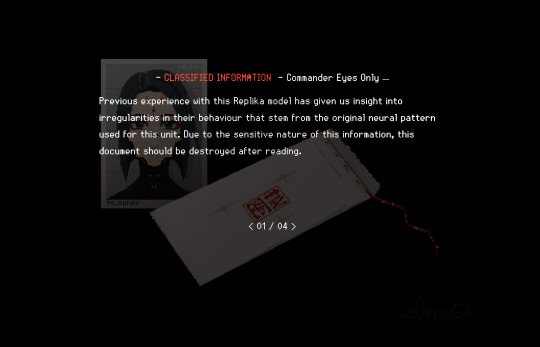
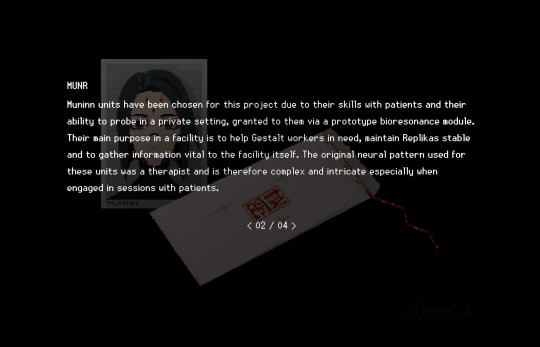
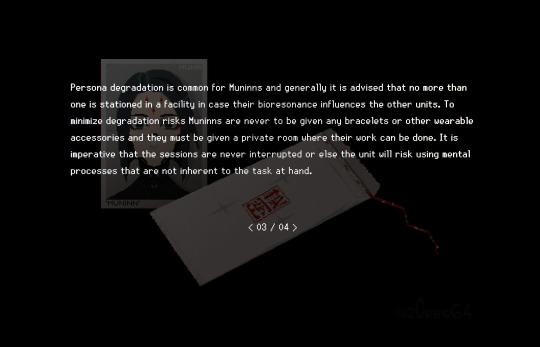

[Replika Known Issues, Vicsek Project]
- CLASSIFIED INFORMATION - Commander Eyes Only –
Previous experience with this Replika model has given us insight into irregularities in their behaviour that stem from the original neural pattern used for this unit. Due to the sensitive nature of this information, this document should be destroyed after reading.
MUNR
Muninn units have been chosen for this project due to their skills with patients and their ability to probe in a private setting, granted to them via a prototype bioresonance module. Their main purpose in a facility is to help Gestalt workers in need, maintain Replikas stable and to gather information vital to the facility itself. The original neural pattern used for these units was a therapist and is therefore complex and intricate especially when engaged in sessions with patients.
Persona degradation is common for Muninns and generally it is advised that no more than one is stationed in a facility in case their bioresonance influences the other units. To minimize degradation risks Muninns are never to be given any bracelets or other wearable accessories and they must be given a private room where their work can be done. It is imperative that the sessions are never interrupted or else the unit will risk using mental processes that are not inherent to the task at hand.
To maintain stabilization it is mandatory for Muninns to wear ‘work clothes’ to both interact with Gestalts (and eventual Replikas) and to create a natural shift in attitude when working with patients. Additionally it is highly encouraged to pair these units with another bioresonant unit as a form of control, to help in stabilization and to extract information in case of malfunction.
#i finally did this i am so happy with it#this is the replika known issues for Muninn most units usually suffer persona degradation so you'll see them wear bracelets or make other#replikas degrade because they help individualizing them and using other neural paths in their head#they are USUALLY HATED by gestalts patients because if functional they are just like kolibris but even more nosey and annoying#meanwhile they are usually liked by replikas because of their motherly nature and general validation of their individuality which causes a#WHOLE lot of problems for the nation#my art#pixel art#signalis#signalis munr#signalis fanart#signalis oc
70 notes
·
View notes
Text
"A person must be truly miserable if they lack the most essential things—or believe they do. Someone who is missing something crucial to no longer feel small. Someone who refuses to give because they claim everything for themselves; the poor unfortunate soul who knows nothing beyond their own desires."
— Jorge Bucay, Argentine author, psychiatrist, and Gestalt therapist
Excerpt from the book "Let Me Tell You a Story" (pp. 65f)
14 notes
·
View notes
Text
Wip Wednesday| Instructions on Mindful Focus | chapter 1 | X X X X
Ethan Hunt is trying very hard to look at ease and comfortable. Martha Colligo took in his deliberate sprawl across the couch. Shoulders purposefully loose, arm draped over the back of the couch, calf propped on opposite knee, an easy grin spread on his face. If she hadn't been looking, she might have bought the act, but Martha was looking. There was a tightness around his eyes that belays his unease, an unnatural stillness about him that could not be comfortable. It was actually a very comfortable couch, and Martha was almost offended on its behalf. It brown, over-stuffed, and could fold down like a futon in case she had to spend the night on-call in the office; in-short, it was a very nice couch, thank you very much. She had picked it out herself, along with most of the rest of the office. The therapists and counselors that tended to the Impossible Missions Force were given a budget and almost free-rein to design their office. Of course, there were official, thou shalt have a 'panic' button, and unofficial guidelines, don't have a chair facing directly away from the door. However, there were certain themes that their offices fell into. It could have been coincidence, but their seniors might just be that good at subtle manipulation. Martha's new office fell into the warm, dim, and cushy schema; one of the more common gestalts, but she was quite happy with how it had turned out.
#instructions on mindful focus#mission impossible#I really need a tag for stuff I write#wip wednesday#I've ~technically~ posted this before but I've edited the hell out of it since
10 notes
·
View notes
Text
Texts in Like Minds: Sally's Books

After her first encounter with Alex, Sally returns home and consults a stack of books while listening to the recording of their discussion. Of this stack, only two titles are discernible. The first book is shown briefly and set aside, and the second is opened to a bookmarked page. This large tome is titled Principles of Criminal Psychology (Fifth Edition), by George R. Booth and Andrew Porter. Sadly, I cannot find even the tiniest scrap of the existence of this book online. It is clearly a textbook, and presumably one she would have kept from her school days given that it’s directly relevant to her career. The bookmarked page is titled “Chapter 27: Gestalt Theory”, and the opposite page features photos of Leopold and Loeb, who I have discussed elsewhere. The text itself is unfortunately not clear enough to be readable.


Returning to the first book we see, there is much more information to be found online. It is titled Gestalt Therapy: The Attitude and Practice of an Atheoretical Experientialism by Claudio Naranjo, first published in 1993.

The recording Sally plays during this moment is their exchange regarding gestalt. This concept is one that the movie highlights in this scene and again at the end during Sally’s address to her peers, but it does not clearly define or explain the idea of “gestalt” for the audience. Gestalt first arose as a philosophical principle suggesting that the experience of the parts of something cannot fully represent the whole of that thing, like the notes of the song versus the experience of the song itself. A cursory search of various articles online can give a brief overview of the core ideas of gestalt psychology. Wikipedia says this:
Gestalt psychologists believed that breaking psychological phenomena down into smaller parts would not lead to understanding psychology. Instead, they viewed psychological phenomena as organized, structured wholes. They argued that the psychological "whole" has priority and that the "parts" are defined by the structure of the whole, rather than the other way round. Gestalt theories of perception are based on human nature being inclined to understand objects as an entire structure rather than the sum of its parts.
This gives us a more thorough explanation of Alex’s very brief description of “gestalt”, but does not provide much insight into the meaning of his hints to Sally or why gestalt would have any bearing on his relationship with Nigel. The implication we are left to surmise is that these two separate boys have combined as individuals to create a whole greater than the sum of its parts, and Sally lampshades this idea at the end in her speech referencing the movie title. However, examination of these two books has given me some new thoughts about the use of gestalt in the film and about Sally’s conclusion regarding the dynamic between them.

Alex’s next words to Sally feel extremely significant and should be considered thoroughly: “It’s not what it is. It’s how you use it.” Given that both these books reference “gestalt therapy” specifically, it’s worth looking beyond the core theory of gestalt psychology to see how therapists actually use these ideas in practice. I found a clear explanation on this page:
Gestalt therapy is an existential and experiential psychotherapy that focuses on the individual's experience in the present moment, the therapist-client relationship, the environmental and social contexts in which these things take place, and the self-regulating adjustments people make as a result of the overall situation. It emphasizes personal responsibility. Gestalt therapy was co-founded by Fritz Perls, Laura Perls and Paul Goodman in the 1940s–1950s.
Gestalt therapy is built around two central ideas: that the most helpful focus of psychology is the experiential present moment and that everyone is caught in webs of relationships; thus, it is only possible to know ourselves against the background of our relation to other things.
I think we can already see some connections with the story as Alex presents it. Alex and Nigel are inextricably entwined in a web of relationship, and we the audience find it impossible to understand either character outside of this context.
Here I would like to suggest some Doylian interpretation which I believe to be possible or even likely, but for which I can offer no concrete evidence. We know that Greg Read initially intended to make a documentary about the phenomenon of two people who match each other’s freak so well that they enable a worsening of sociopathic tendencies to the level of violent criminal behavior. In one interview, he referenced a paper he read about gestalt psychology which opened doors in his mind and led him down this path. He had developed the documentary idea enough to show it to other people, and someone told him it would make a great fictional movie. Based on this, I assume he must have acquired additional materials beyond that first paper, conducting extensive research on the idea in preparation for the documentary. I posit that the books Sally uses in this scene are Greg’s books, or copies of the same books he had referenced. All of Sally’s scenes were filmed in Australia, so it’s not outside the realm of possibility that he simply brought (or already had) his own books on set.
Working from that assumption, the ideas found in Gestalt Therapy: The Attitude and Practice of an Atheoretical Experientialism might be taken as extremely influential on Greg’s thought process in writing this film. While the whole text is not available online, there are a few excerpts one can read for free here. (The book itself is available through multiple websites for around US$40 at the time of this post.) If we examine the excerpts below within the context of the movie, a few things really stand out (emphasis mine):
Perls sometimes stated the principle entailed in such strategy as one of absolute validity: You never overcome anything by resisting it. You only can overcome anything by going deeper into it. If you are spiteful, be more spiteful. If you are performing, increase the performance. Whatever it is, if you go deeply enough into it, then it will disappear; it will be assimilated. Any resistance is not good. You have to go full into it—swing with it. Swing with your pain, your restlessness, whatever is there. Use your spite. Use your environment. Use all that you fight and disown.
This sounds remarkably like the process Alex goes through with Nigel, resistant at first and gradually leaning into the swing, learning to embrace and roll with all the things he was fighting against. A case might also be made that Nigel partakes in this process as well: he too is resistant to Alex initially, but the train scene marks a turning point in which he seems to make the decision to lean into the violence that Alex offers.

Returning to Alex’s assertion that it’s not about what gestalt is, but how you use it, these passages take on a whole new meaning. Sally’s speech at the end of the movie suggests that she arrived at the conclusion, based on her belief in Alex’s version of events, that Nigel essentially used the techniques of gestalt therapy in a twisted, malicious way to manipulate Alex towards the culmination of the film. As she says,
“What follows, through a system of either intimidation, manipulation, or coercion, is the dominant individual begins to focus and influence the thoughts of the subordinate partner. This process nurtures a subjective gestalt where similar thoughts, fantasies, and other interlocking elements conspire to form a greater and more volatile whole, therefore, a merging of like minds.”
Now read the excerpt below in light of these descriptions:
In the strategy which pervades Gestalt practice, the therapist is leading the patient through a process similar to that through which a child that is learning to sit on a chair needs to discover that he can sit only by giving his back to the chair, not by moving towards it. While this is a discovery that many make at a certain point in a typical session, a spectator may not share the insight. The patient discovers that his resentment was a diluted and devious form of healthy aggression, for instance, but this spectator may be frightened by what he sees as destructive loss of control; what the patient experiences as a rewarding and cleansing explosion of grief, brought about by the exaggeration of emptiness, the observer without familiarity with Gestalt may fear that the therapist, by urging on the patient’s symptoms, may lead him to suicide. The therapist’s ability to bring a patient to the turning point where his disowned destructive energies become his own purified strength will depend, in large measure, not upon technique alone, but on his experiential knowledge that this is possible, and in the consequent sense of trust in the constructive drives of which pathological manifestations are a distortion brought about by unhealthy denial and which can heal by itself in the presence of awareness. Such trust will enable him to pursue a given course of action to an effective degree, in spite of the patient’s chaos, rage, or loss of control—and will be important, too, in eliciting the necessary trust in the patient for him to let go. Gestalt therapy is based on the principle that to alleviate unresolved negative feelings like anger, pain, anxiety, and resentment, those emotions cannot just be discussed, but must be actively expressed in the present. Without that, psychological and physical symptoms can arise.
These passages represent the intended healthy expression of these principles. If we take these ideas and techniques and twist them into an unhealthy, intentionally manipulative and toxic dynamic, it maps quite clearly onto the relationship between Alex and Nigel and the actions they take throughout the film. Sally assumes that Nigel is in the role of the “therapist” leading Alex the patient through this process. The movie’s ending presents itself as a twist and suggests that these roles were in fact reversed, particularly in light of Alex’s first interview with Sally and his ominous and vague statements about Nigel's death being a necessary means to an end. If we accept that conclusion at face value, then consider how Alex “urging on the patient’s symptoms” may have actually “led him to suicide���.
The Gestalt therapist contrives experiments that lead the client to greater awareness and fuller experience of his/her possibilities. Experiments can be focused on undoing projections or retroflections. They can work to help the client with closure of unfinished Gestalts ("unfinished business" such as unexpressed emotions towards somebody in the client's life).
What is the climax of this movie if not Nigel creating a violent type of closure with his unexpressed emotions toward his parents? “It’s how you use it.” Did Alex use gestalt therapy techniques to draw Nigel into this violent chain of events as “a means to an end”? If so, what actually was the “end” he desired?

Incorporating this information into our interpretations of the movie still does not necessarily force us into accepting Alex as Mastermind as the only reading. I think you can certainly see that dynamic, but it doesn’t preclude Nigel as Mastermind. In my further reading regarding gestalt therapy, I found this passage in a blog post:
A thirst for experience is part of all life. Often though, this takes the form of a wanting to move on and on to other experiences than those at hand. A craving for more replaces the need for depth that could be our natural mode of contacting the world, had we not become desensitized to it. Intuitively seeking that depth or fullness of awareness that is on our birthright, and not finding it, we seek the substitute of environmental stimulation: spicy foods, rock climbing, high-speed sportscars, competitive games, tragedies on the movie screen.
This describes Alex perfectly and speaks to his own need for the gestalt therapeutic approach. We could argue that Nigel addresses this drive for more experiences by bringing Alex into a focus on the depths of the present moment, existing in the now that Nigel creates for him as he attempts to understand his own feelings and reactions. As the book puts it:
The Perlses believed that it is not our responsibility to live up to others' expectations, nor should we expect others to live up to ours. In building self-awareness, gestalt therapy aims to help clients better understand themselves and how the choices they make affect their health and their relationships.
My own interpretation is one of equal partners both playing the role of therapist and patient to each other. Gestalt therapy relies on the ability of the therapist to set aside their own interpretations of the patient's experiences in favor of allowing or guiding the patient to arrive at their own understandings and conclusions. I do not think that sole responsibility can be placed on either Nigel or Alex, and the events of the movie could not or would not have transpired without the active participation of both boys in each other's lives. While the context is a dark expression of these ideas, both Alex and Nigel help each other build self-awareness and achieve a better understanding of themselves.

Like Minds Masterpost
#i just had to put that shot of Sally at the end because she's so absolutely gutted at her own failure - i'm so mean#greg really did say what if two guys matched each other's freak#like minds#nigel colbie#alex forbes#nigel colbie x alex forbes#tom sturridge#eddie redmayne#murderous intent#like minds 2006#like minds analysis#murder boyfriends
45 notes
·
View notes
Text
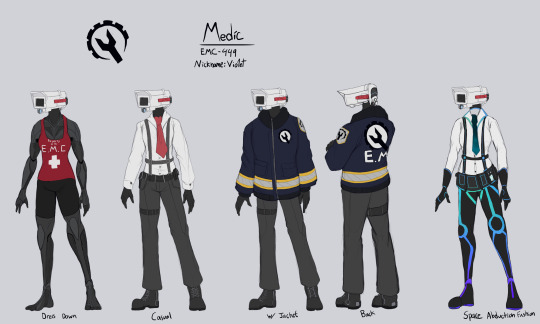
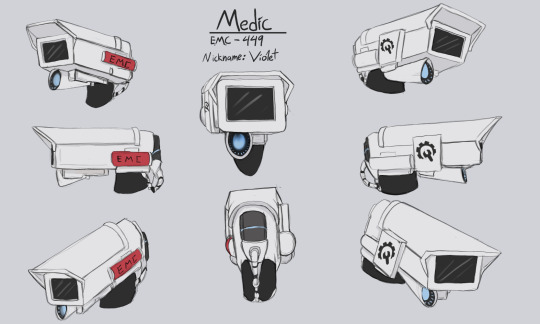

FINALIZED CONCEPT ART FOR MEDIC/VIOLET <3
NAME: EMC-499 NICKNAMES: Violet, Medic, Pest (By Paralipsis), Kid (By Civic) ALLIANCE CLASS: Cameraman Faction WORK CLASS: Emergency Medical Cameraman Division (EMCs) GENDER: She/Her
CLASSIFICATION: Artificial Mind (non-human origin)
RANK: Chief Medical Officer and Head Therapist of Psychological Affairs of Outpost 51
EMC-499, known as Violet or Medic to those who know her best, is a spunky camerawoman who graduated the E.M.C Training Regiment at the top of her class. She knows her stuff when it comes to best medical practices and like all E.M.Cs, also trained to handle mental health.
Friendly, outgoing, and absolutely fearless when it comes to her job (not so much social situations), Violet is the "unsinkable" camerawoman, who refuses to let anything get to her and to help her friends whenever she can.
(more details under the cut!)
EMC-499 was brought online as an artificial mind which is to say, her mind and personality did not come from a human host, but developed organically through interactions with her online cohort. Eventually, one of the older cameramen, known by the nickname Gestalt, would adopt her and show her the ropes.
Eventually EMC-499 would endeavor to join the Emergency Medical Cameraman Division, inspired by their work of helping others during and after battles, risking life and limb to save their comrades. Such bravery appealed more to her and Gestalt was happy with that...mostly as he saw it as a way to keep the rather diminutive EMC-499 away from actual combat as much as possible.
EMC-499 did not know of these plans, throwing herself into her studies and coming out at the top of her class. Among her training cohort, she gained the name "Violet" in reference to Violet Jessop, as a tongue and cheek joke of her being "unsinkable" in her endeavors to become the top E.M.C responder.
Once graduated, Violet was more than eager to get into the fight and put her training to use on the front lines and not just patching up alliance in the medical bay. Instead, she was sent to Outpost 51 to handle the most "difficult mental health cases" in the Alliance, keeping her far from the front and relatively out of sight. Violet was disappointed, incredibly so, but a job is a job and she has thrown herself into helping the residents of Outpost 51 on her case load.
The title of Chief Medical Officer is not too glorious, given she is the only E.M.C on duty at said outpost. Still, she hopes by doing a good job she can prove she's ready for the frontline or even to get promoted to the E.M.C Titan Division. Most of her friends and charges call her "Medic" as a result, which she doesn't mind. THE EMERGENCY MEDICAL CAMERAMAN (ramblings here just because Violet/Medic would ramble on about her beloved E.M.C hehe!) A relatively new division that grew out of the growing need for medical professionals as the causalities mounted and concerns about mental health became more prominent.
The E.M.C are trained to get alliance off the field and provide life-saving treatment with a variety of tools taken into the field. They also though perform crucial screenings for mental health to ensure alliance going into battle are of a sound mind and are cleared for combat. Not to be confused with engineers, the E.M.C are focused on physical and mental well-being, not on upgrade research , rebuilding of bodies and lost limbs, or mind recovery and transfer operations. A small, elite division of the E.M.C, called the Titan Division, are assigned to assess mental states of the Titans to ensure that the mighty backbones of the alliance are given the proper attention to all points of their health.
The E.M.C is currently assisting with the training of the new E.M.S (emergency medical speakermen) division to help expand their roster. Currently an E.M.T division has yet to be established, the TV Men preferring to use the E.M.C services due to their smaller numbers in general within the greater alliance.
#skibidi toilet oc#skibiditoilet fandom#cameraman#cameraman oc#Camerawoman OC#Violet the Hard Working Medic#The Smollest Medic#The Phonemen Aren't Real AU
9 notes
·
View notes
Note
SG constructicprowl?
With Prowl sparked (or the other way around, your choice)
Oooh ok, immediately I'm thinking of Prowl carrying. Normal Prowl is a bit of a bastard but shattered glass Prowl is just an evil, manipulatative mastermind. Even tho the war is over and even tho the constructicons love him very much, he's still incredibly insecure and needs to be in control at all times. He uses the carrying cycle to make them do anything and everything under the sun, and the structies are just big puppies. They're pampering and spoiling him 24/7 and are always at his beck and call. There's nothing they wouldn't do for him
Prowl probably sows at least a little bit of discord in them during this time, especially if one manages to piss him off. A little infighting keeps things spicy, and makes them even more desperate for his approval and attention. I think, in reality, he's got some mental health issues that he should really see a therapist for, and is secretly afraid of losing them and feels like a poser in the gestalt. It's not the healthiest relationship, not by a long shot, but I do think over time he'll soften. Their love never falters or wavers, and in that he becomes more comfortable. They probably know exactly what he's doing and just go along with his little ploys 🤭
125 notes
·
View notes
Note
What is your honest opinion about Paul? What do you like, what do you dislike about him? ☕️
I like
most of his music, his ease of creation (not a tortured artist), the fact that he's also painting and making these postcards and designing logos and having his legendary, beautiful handwriting—in short, that he seems to live and breathe art and creativity on both a grand and domestic scale. It gives me joy to see.
I like that he uses his guitar as his therapist.
That he doesn't try to be cool (for well you know that it's a fool...).
That he resists our demands to explain himself.
Finally, I like his musical versatility, his curiosity, his pride and sense of who he is and what he can do.
And of course his beguiling and inspiring physique and gestalt through the years *brandishes comb*
I quote unquote don't like
That he keeps telling the same stories, and I don't mean this in the 'tell us more about canoodling' sense. Just...how, as an intelligent person, can you live with the repetition. It's horrifying. Why. Stop it.
There's nothing else about him that truly bothers me. The wall of repetition and the rigid public persona is it, but "dislike" is a strong word. "Frustrates my curiosity" would be more honest. And I *do* admire his resistance to our demands that he explain himself, see above.
Hmmm.
(coffee and honesty)
13 notes
·
View notes
Note
i'm really happy for you! can i ask what kind of therapy you had? it's never seemed to help me much so i'm curious!
Thank you!!♥︎ My therapist used a blend of different counseling theories with me, but primarily cognitive behavioral therapy and dialectical behavioral therapy techniques, as well as hypnosis for some very specific issues. The behavioral therapies are fairly common, so I wouldn't be surprised if you have tried those and they weren't helpful - they tend to be best for very specific concrete behavioral changes, but aren't always the best for exploring deeply rooted issues. Obviously, I don't know your specific situation, but there are a whole range of other therapeutic theories and techniques that are somewhat less common but may be more helpful if CBT and/or DBT haven't worked for you. Psychodynamic therapy tends to explore your past, early attachments, and current relationships to unpack how your subconscious experience is impacting your conscious experience. Existential therapy techniques are helpful for handling things like existential crises, grief, and death (edit: I originally wrote Gestalt where I meant existential). If you're struggling with dealing with stressors related to being a woman, a minority, or otherwise oppressed group, then you might benefit more from a therapist who has a focus in feminist therapy. Acceptance and commitment therapy can be very helpful if your issues tend to be treatment resistant - it focuses on being able to engage in positive behaviors even when your moods and thoughts are extremely negative. There's a range of options, and each can help you differently.
I also specifically sought out counselors who focused more on accountability than validation. Your therapist shouldn't tear you down, but they also shouldn't constantly validate your behaviors and emotions either. I was a relatively uncooperative patient, so having a therapist who would hold me to my word was an important factor for me. If you're having a hard time opening up to a counselor, it may be an issue of personal compatibility. It's not always the techniques but the counselor themself - sometimes because they're not good at what they do, sometimes because their personality is one that you have a hard time opening up to. Don't be afraid to window shop when it comes to therapists. I always recommend going to 3 sessions before deciding to stick with them or try someone new. The first session is almost always entirely intake, so you won't get a good idea there, but if you can't stand, don't like, or simply don't want to work with the therapist by the end of the 3rd session, leave. You are not obligated to them, and counselors are rarely cheap.
One big caveat to all this is that if you know the coping mechanisms and the strategies for dealing with mental health issues you have, but none of it is effective, you should at least explore the idea of medication. It was a problem for me where I knew the coping mechanisms that I needed to use, knew how to use them, but my emotions were so off the charts strong that I didn't have the capacity to use them properly. Most people have a threshold of emotion at which most healthy coping mechanisms are ineffective, but if you're in that state most or all of the time, it's worth looking into psychiatric medication. Psychiatrists can be a major pain in the ass in terms of finding a good one, but once you have a good one, they can change your life.
7 notes
·
View notes
Note
What if there is no therapist and therapy in the twisted wonderland and Yuu becomes the first therapist of the wonderland. The next generation will remember and know them as the father/mother of therapy. (and the magicalless person from another world who also is a friend of a lot of really famous people)
So I imagine Yuu creating the first psychological branch to exist in Twist lol. Many psychology studies were previously considered pseudo-sciences until they started doing research and tests, later becoming proven and used. In fact, I did a year and a half of psychology but I didn't feel like that area was for me, so I changed my major.
I imagine Yuu could use a specific branch like, for example, behaviorism/gestalt/psychoanalysis. Or, mix them all into one, trying and trying to see what works. Because they have no powers, only prior knowledge of their world, then helping others and founding a school of psychology would be both beneficial and profitable for them in the long run
Yoo their famous friends could also be their patrons 🤔🤔
I can totally see Vil funding their school because, as a model and a very loved one, he is very prone to overwork himself and he is a perfeccionist at that. So yeah, he know the importance of a healthy mind
Leona as well. Maybe with enough therapy, he'll finally realize how bad and unfair his life was and how depressed he truly is. My poor little meow meow ;^;
Kalim, Cater and Malleus too. And Trey could talk about Yuu to his customers, speciakly the ones he realize that are feeling a little down or are unsure about their vocation
Overall, I feel that Yuu's psychology would skyrock after they graduate. For sure, they'll be loved for their benevolent heart and how they created something that help so many people
9 notes
·
View notes
Text
Let's play a game of: spot an INFJ personality type
Warning: Long and large image post ahead
Always planning ahead. Effectiveness may vary.
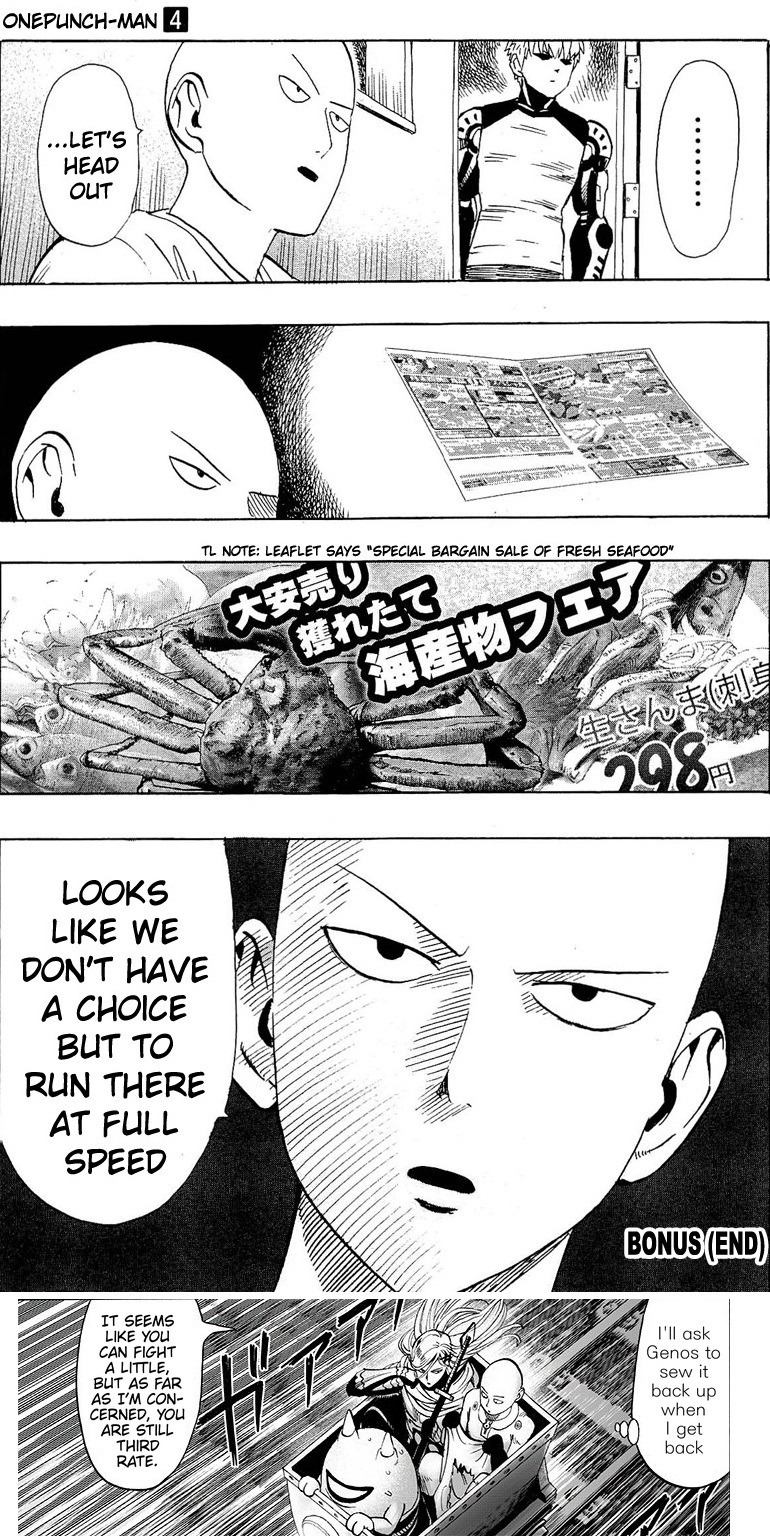
But they love to be spontaneous when the opportunity presents itself.

Certified overthinkers and ruminators under duress. The higher the personal stakes, the worse off they will be.
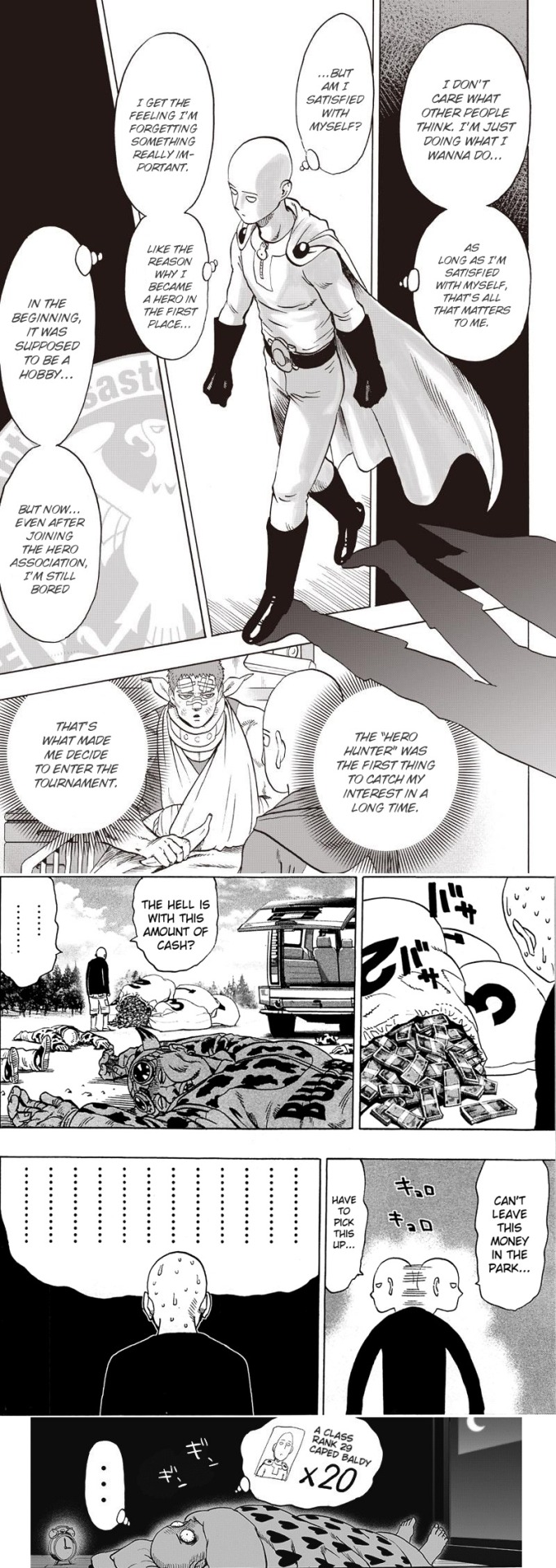
Will absorb and mirror other people's energies like a sponge, want it or not.
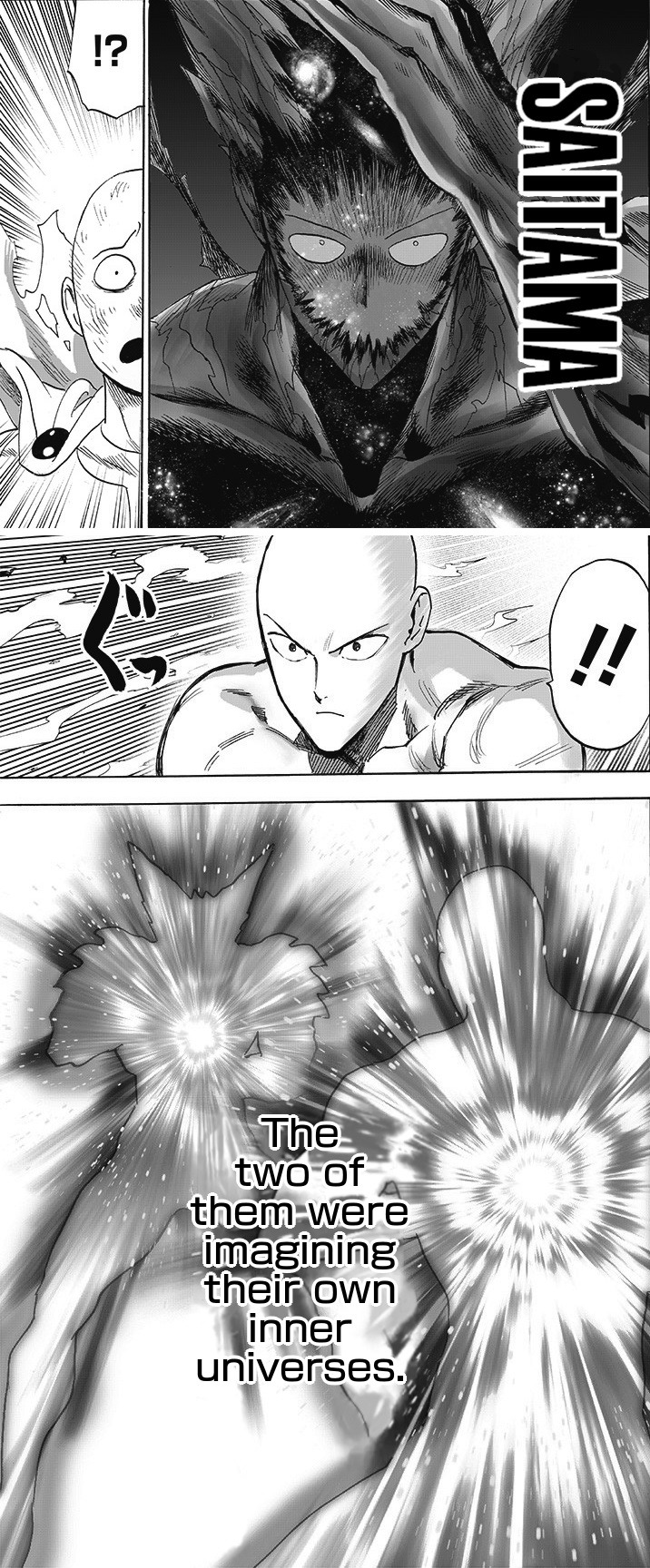
May appear spaced out and walk with their heads in the clouds, absorbed in their inner scenarios and fantasies. Their inner world is often more interesting to them than reality due to their inferior cognitive functions.

Sensitive to criticism and aggression due to their sensitivity and people-pleasing nature, they come out of their shells slowly even to the people they care about, afraid of being misunderstood.
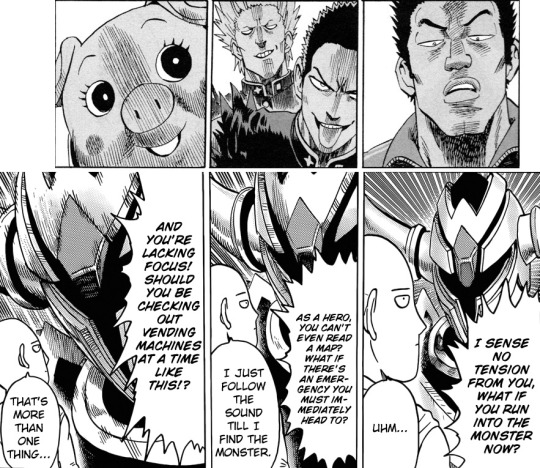
At their core, generally helpful, forgiving and kind people who tend to give other people multiple chances to redeem themselves even if slighted and emotionally betrayed.
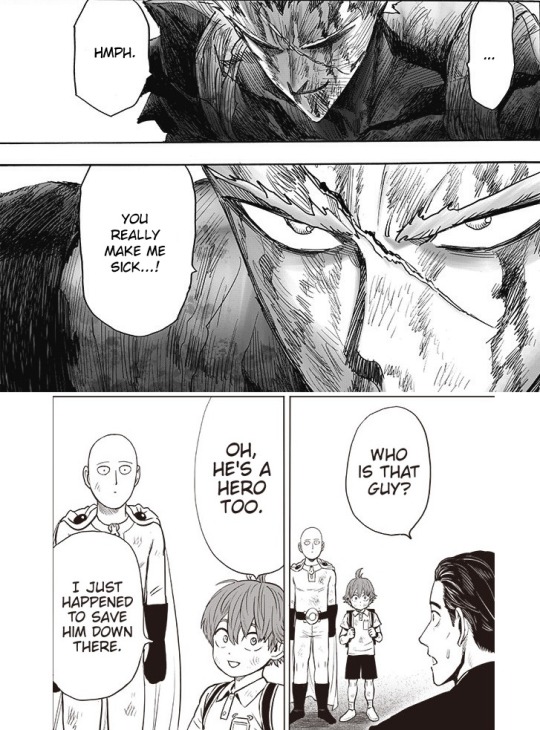
Prone to double standards, dubious morality and black and white thinking, end justify the means line of thought because of their high moral integrity and empathy can juxtapose or conflict. Sometimes immature about interpersonal relationships and naive.

May even resort to lying and unscrupulousness in order to protect others or their own interests.

(Rules for thee, but not for me)
Social chameleons who can blend in and often mysterious because of their privacy, but feeling like they are never being understood. The infj personality type is said to be the rarest in the world.

Can appear to see into the future due to their cognitive functions, even if they are not psychics, because they are great at reading patterns.
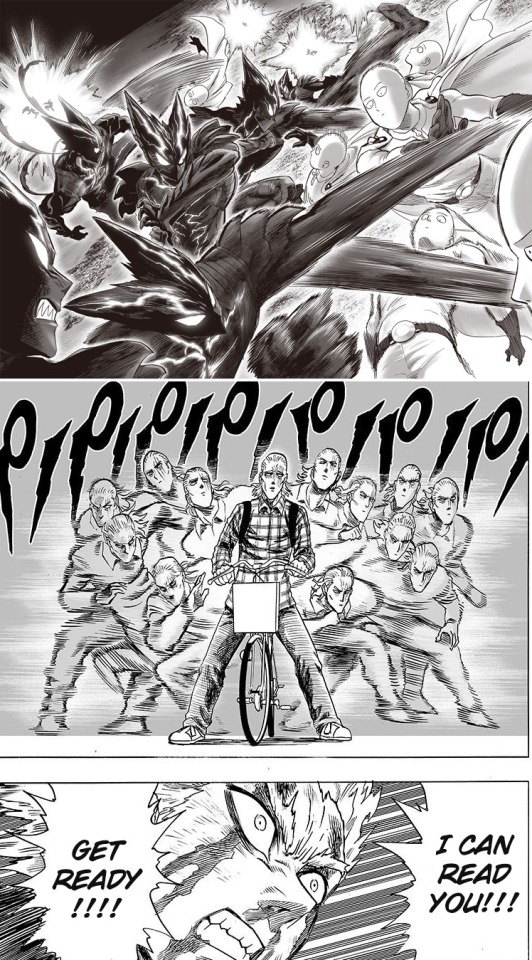

Can be one of the kindest people you will ever meet or the cruelest, most manipulative villains you will ever see. If you see them, that is.
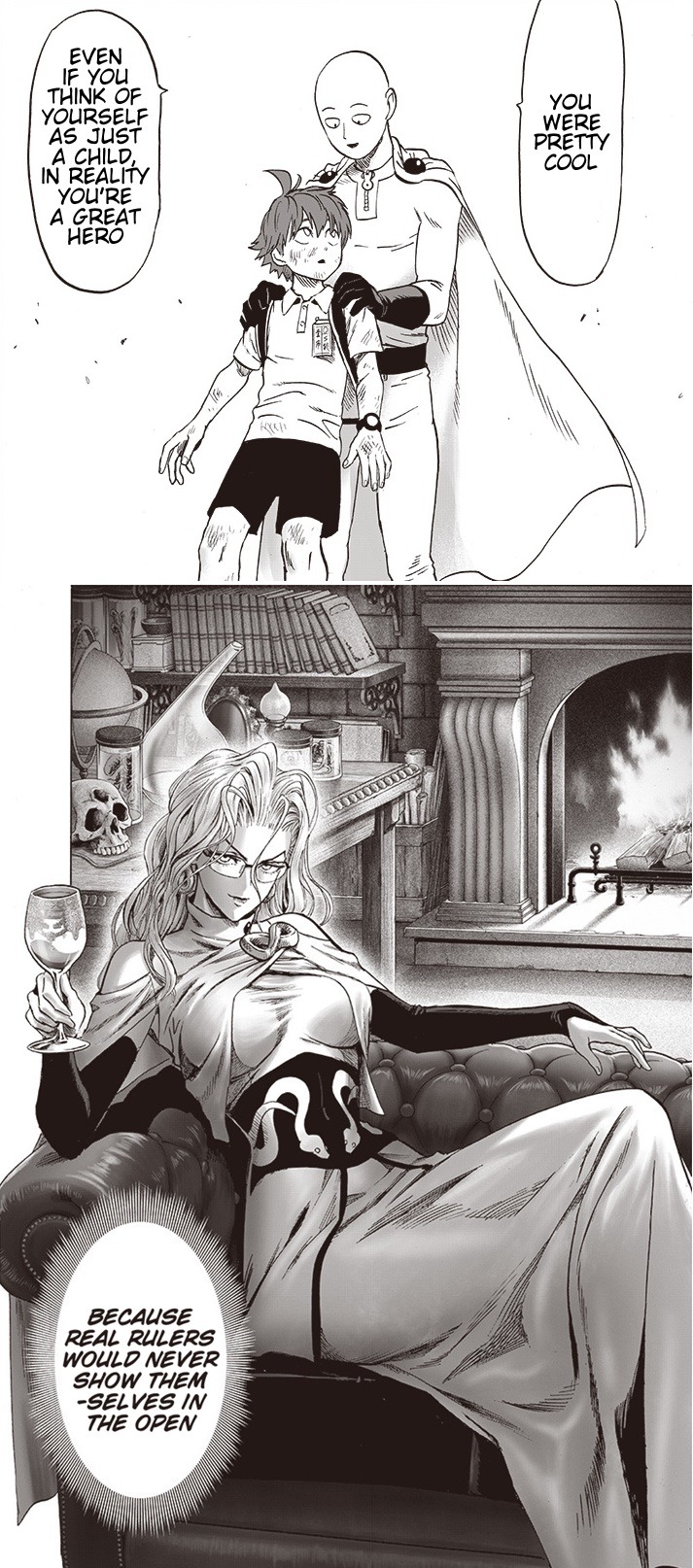
People-problem solvers and self-appointed therapists.


Sometimes too emphatic for their own good. When others are hurting, they hurt too and they may emotionally distance themselves in ways to protect their empathy as they grow into their cognitive functions.
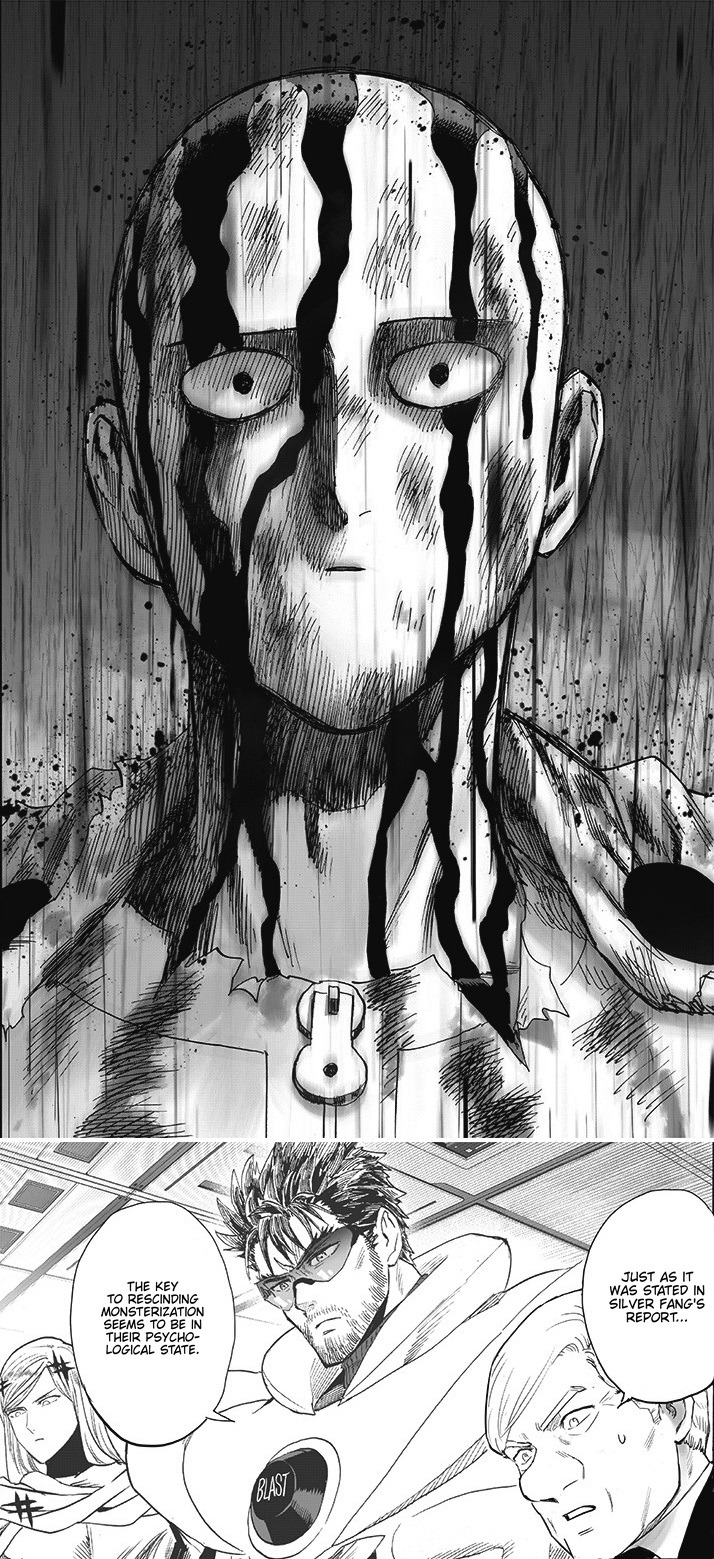
Want to solve the worlds problems alone, even to their own detriment because they can be very independent and headstrong people.


Rare as they get, so they often suffer from loneliness because of their ideologies, left craving for emotional intimacy.
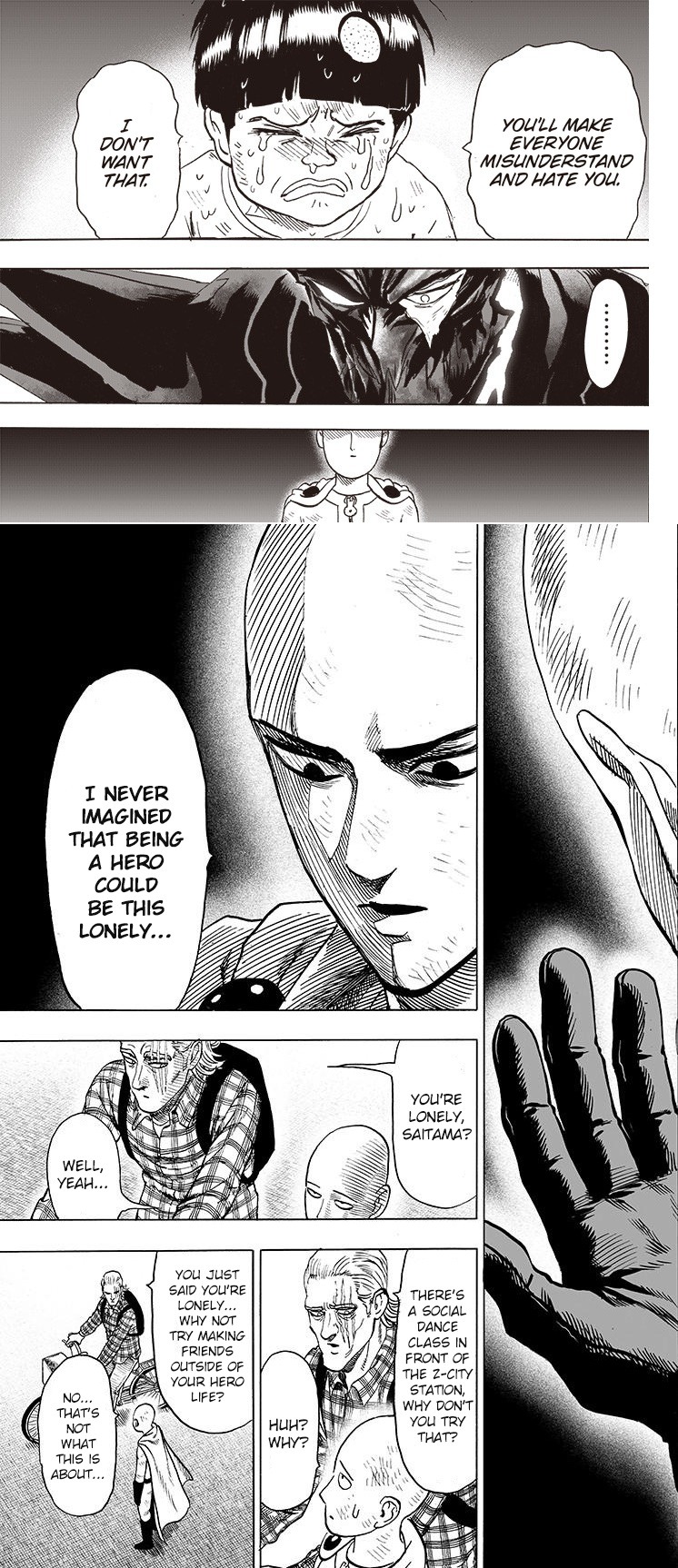
Saitama: That’s not the point... I have the feeling that things like a heart to heart interaction, sharing an umbrella, warmth, are all things broken away in my life. Other people can have things like big events and circumstances happening, romances and such bringing happiness in their daily lives. I have the feeling something broke and that sweet-like fluffy, nice stuff just fell right off from me. That's what I meant.
-- Saitama and the mysterious heroine, audiobook season 2
Intellectual and philosophical one to one conversations can be stimulating like black coffee to them.
Saitama: Mmm…what does “strong” really mean, at the end of the day? Genos: I see, the view that great combat prowess = strength is too simplistic. Saitama: Right, after all, there are many different ways to define strength. Saitama: Like the strength to fight against your own weakness. Genos: The strength to not consider the strength to fight against your own weakness a strength. Saitama: (Speeding up) no no no, the strength to not consider the strength to fight against your own weakness a strength, is that really strength? What about the strength to endure being constantly annoyed? Saitama: (Speeding up) Huh? Genos: (Speeding up) This is becoming the collapse of the strength gestalt. Genos: (Speeding up) No, maybe that is strength in its truest form. …… Sound of heavy breathing
-- Maji drama cd, vol 1.
May lash out when their logical conclusions and actions are prodded and challenged because they tend to look at things from every angle.

Paradoxically they love people and can be the most extroverted of the introverts, but they also want to be alone to engage their inner world.
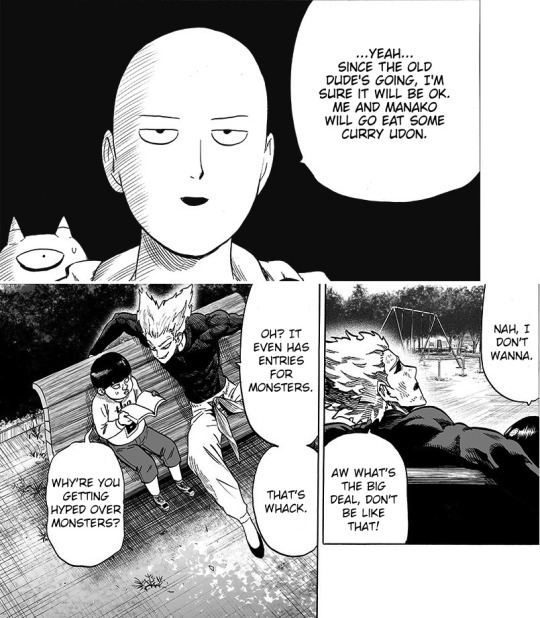
Also paradoxically, they don't care for heart-to heart interactions unless they see a future with that person in it and and will doorslam if this bubble is invaded. They're an excellent judge of character at a glance when their cognitive functions work in tandem.
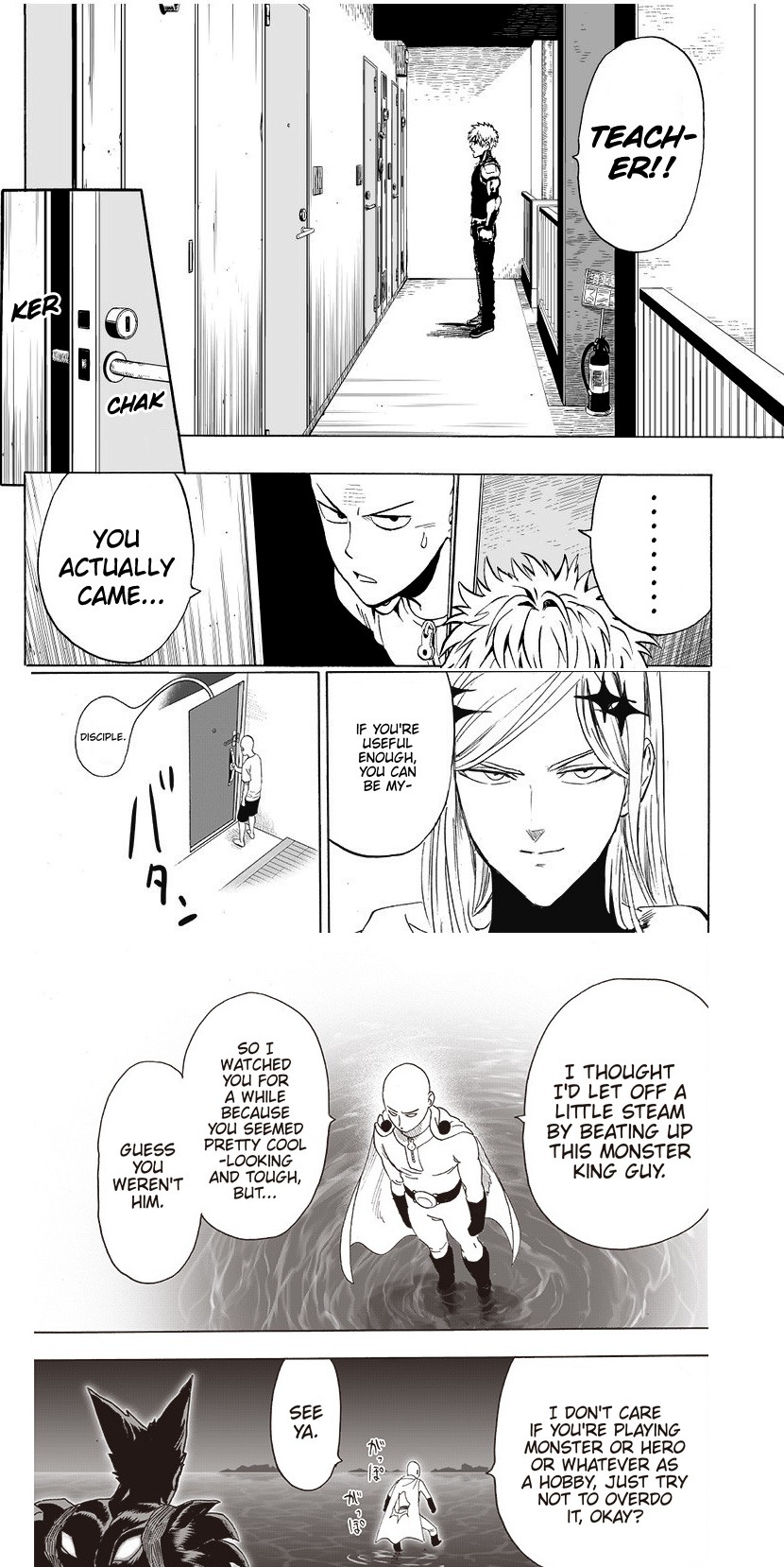
Also an enjoyer of morbid and dark sense of humour.

Appealing to their fantasies and engaging all of their cognitive functions with the physical world will effectively seduce them and lower their inhibitions.

It is said they possess a sixth sense due to their pattern reading capabilities and spiritualism.
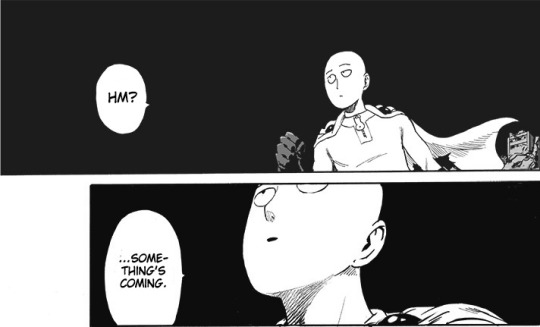
#opm#one punch man#saitama#opm blast#psykos#garou#opm meta#infj personality#character analysis#my own work#opm manga panels#long post
21 notes
·
View notes